Our Approach
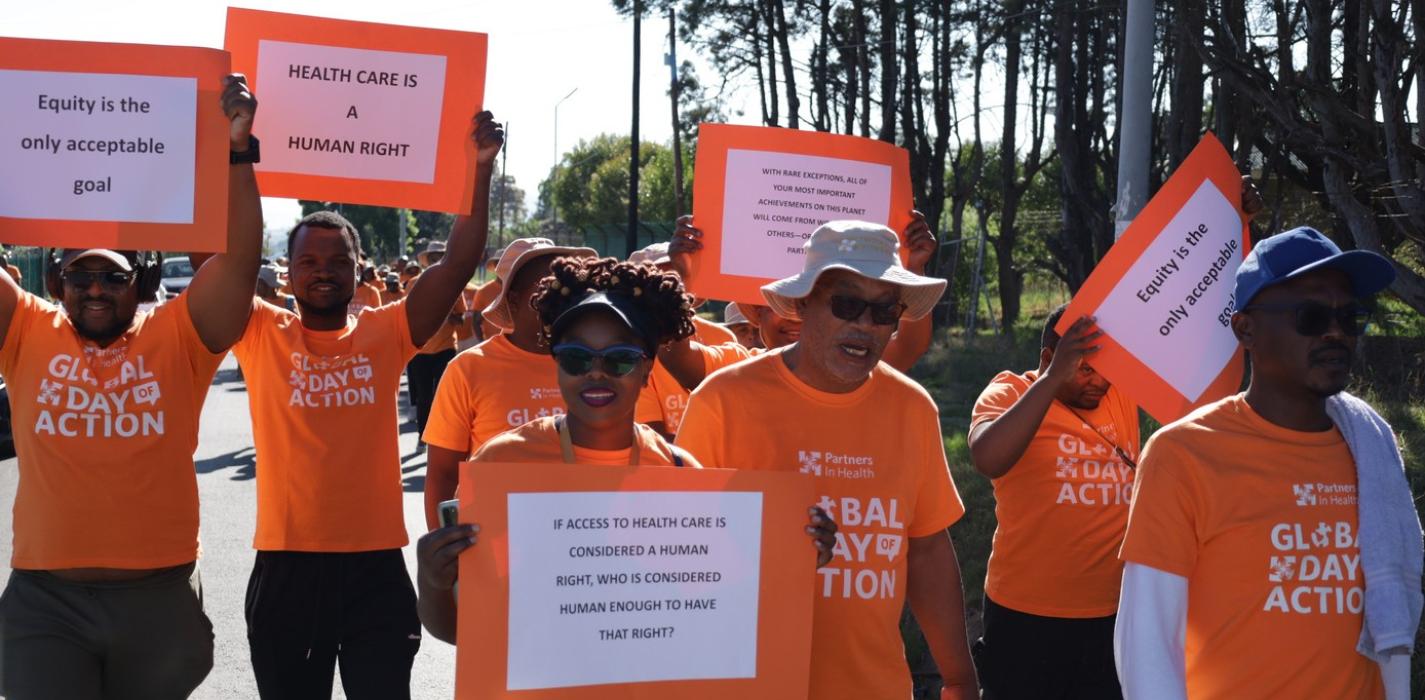
PIH’s “Five S’s”
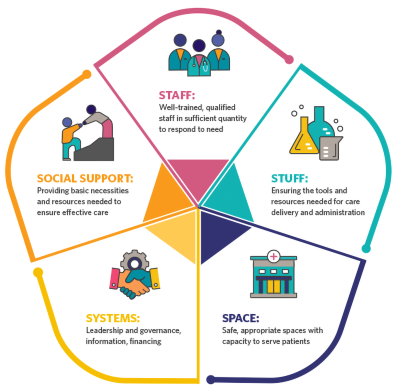
We look at health system strengthening as a mix of five fundamental ingredients: staff, stuff, space, systems, and social support. Removing any one item would result in a weaker health system overall.
1. Staff
We make it a priority to have well-trained, qualified teams in sufficient quantity to respond to needs around the globe. The roles of our staff are diverse and fall into nearly two dozen categories, such as community health, mental health, operations, nursing, program management, development, and communications.
2. Stuff
The list of “stuff” we need is vast and includes everything from proper and ample vaccinations and medications, such as antibiotics to treat tuberculosis, to IV fluid and oxygen supplies. PIH’s global supply chain team has a list of 2,518 different items selected to streamline procurement orders, standardize requests from health facilities to warehouses, and align with the different protocols in country. Because of their efforts, our colleagues have the tools and resources they need for care delivery and administration.
3. Space
In order to treat patients, we need safe, appropriate spaces equipped with electricity and clean water. Sometimes these spaces already exist, but in most cases, facilities need to be renovated or built from the ground up. In collaboration with partners, PIH creates, expands, and equips spaces so that they meet clinicians’ needs and provide a healing environment for patients.
4. Systems
This area of the 5 S’s seems invisible, but is no less important. Many systems must work in harmony to ensure consistent, quality care for patients around the world, including a leadership and governance structure for solid decision-making, financial and accounting systems to track income and expenses, supply chain management to ensure well-stocked health facilities, medical informatics expertise for nimble record-keeping, and more.
5. Social Support
To ensure effective care, we provide basic necessities and resources, including food, housing, transportation, and financial support for patients and their families. PIH’s social support programming across all sites focuses on treating the whole patient, not just their condition.
Social support has proven an essential part of patient care and made the difference between a patient’s ability to recover from sickness and maintain good health over the long term. This support comes in many forms such as food for patients on taxing tuberculosis treatment regimens.
Government Accompaniment
For over 18 years, PIH Lesotho has supported the government of Lesotho by providing health services and strengthening the health system. PIH Lesotho offers a unique model of accompaniment. It extends across staffing, infrastructure, systems, policy development, and service delivery.
Technical Assistance To Ministry of Health (MoH)
- Policy e.g. Mental Health Policy, VHW policy, Oxygen SOPs.
- Oxygen scale-up strategy, laboratory strategic plan, TB & HIV strategic plan.
- Covid-19 guidelines development, Emergency referrals, standard treatment guidelines, and critical care.
- Technical Working Groups: TB, HIV, MH, O2, SI, PMTCT, Digital Health, community health, MCH, QI, supply chain, EPI.
- Conducted decentralization readiness assessments in four districts; Mohale’s Hoek, Leribe, Mafeteng, Butha-Buthe.
- Professionalization of VHWs program.
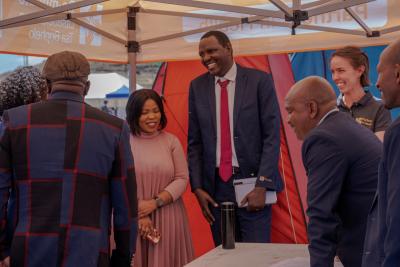
PIH participated at the Mental Health Day Commemoration by Ministry of Health in Butha Buthe.
Bio-medical Engineering Support
Advocacy for a Bio-Medical Center of Excellence for long-term sustainability maintenance of medical equipment.
2025 marked the completion of the Biomedical Center of Excellence; a major investment in the sustainable management and quality assurance of medical equipment. This facility reflects PIH’s growing internal capacity, with a dedicated team of two biomedical engineers and two technicians now handling most equipment maintenance in-house. This shift has reduced downtime, shortened emergency response times, and significantly lowered costs that were previously spent on external service providers.
The Center will serve as a national training hub, equipping technicians, including those from other technical backgrounds such as electrical engineering, with the skills needed to manage hospital equipment. It will also function as a quality control site where all maintained equipment is verified and tested before being returned for clinical use, ensuring safety, accuracy, and compliance with medical standards.
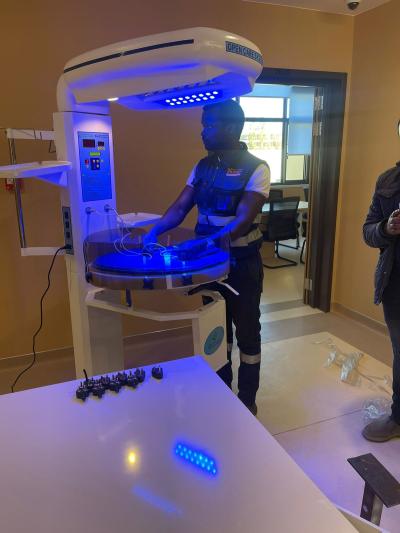
Mphatso Tsoka, Senior biomedical engineer installing a neonatal baby warmer at Maseru District hospital.
Oncology Support
Partners In Health Lesotho supports the ministry of health’s oncology program with diagnostic services, reducing turnaround time for results that once took months.
Through strategic partnerships with institutions such as the Dana-Farber Cancer Institute, the Butaro Cancer Center of Excellence, The Bristol Myers Squibb Foundation, and the University of Pennsylvania, PIH brought world-class expertise to Lesotho, including virtual tumor boards and visiting oncology professionals. The introduction of telepathology at the National Reference Laboratory further revolutionized diagnostics, cutting result times from six months to just three days and giving patients a real shot at timely treatment and survival.
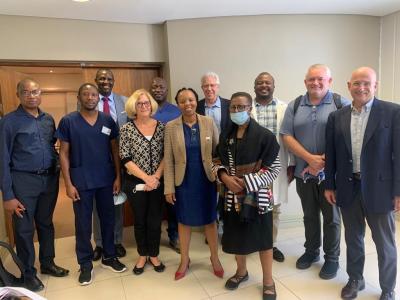
The Dana Farber and University of Pennsylvania Oncology team visiting Lesotho, with Lesotho’s specific senior leadership members
Next Generation Of Doctors
Accompanying the Ministry of Health to train the next generation of doctors.
Through a Memorandum of Understanding (MOU) with the University of Global Health Equity (UGHE) in Rwanda, Partners In Health Lesotho accompanied the Ministry of Health by sending two Basotho students to study medicine on full scholarships. Graduates will earn both an MBBS and a Master of Science in Global Health Delivery. In return, the students commit to working in Lesotho’s public health sector for at least six years. This initiative is part of PIH’s effort to strengthen the country’s healthcare system by training a new generation of doctors.
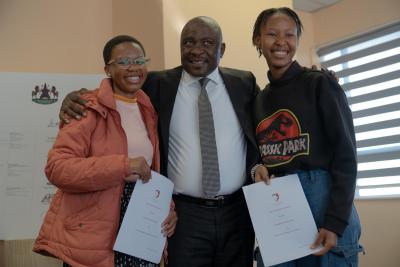
Two Basotho students, Nteboheleng Khatoane and Liao Molapo, who have been awarded scholarships by UGHE to pursue Medicine at the University of Global Health Equity, pictured with the Minister of Health, Hon. Selibe Mochoboroane.